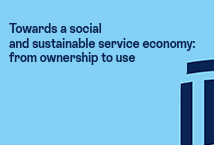- Home
- ESEC SCOPE
- Publications
- Towards a social and sustainable service economy: from ownership to use
Towards a social and sustainable service economy: from ownership to use
Visuel

Type of text :
Opinion
Type of referral :
Own initiative
Working group :
ECONOMIC AND FINANCE COMMISSION
Date d'adoption
Date adopted : 06/28/2023
Mandature
2021-2026
Rapporteur(s) :
Photo

Patricia BLANCARD
Photo

Fany RUIN
Overview
Présentation
Combining performance and trust in the service of the environment and people
In a nutshell, the service economy is the supply of products/services seeking useful effects and performance in use, co-constructed by the consumer, the company and the employee, and taking account of social and environmental considerations.
For a company, committing to this approach means choosing:
→ a business model that puts the environmental and social dimensions at the centre,
in line with the principles of CSR (Corporate Social Responsibility);
→ a local base that encourages collaboration between local players based on trust and
long-term commitments.
For example: with the service economy, we are moving from selling a tyre to making a tyre available with a usage performance contract offering services to meet the needs of the user as closely as possible, including through the use of data transmitted by on-board electronics. Although this model has been around for several decades, its development involves far-reaching changes to the company, which can undermine its financial equilibrium. However, the current context offers new opportunities for entrepreneurs: the priorities given to strengthening strategic autonomy, relocation and re-industrialisation, the local and circular economy, and a better sharing of added value, are all factors favourable to the development of the service economy.
According to the ESEC, the service economy must be both social and sustainable: eco-design of products that takes account of consumer needs, with the aim of making them repairable and recyclable; revaluation of the role of women and men in the running of businesses; greater attention paid to the needs, satisfaction and protection and consumers. Locally, the players in the service economy are creating links that contribute to the development of an ecosyste.